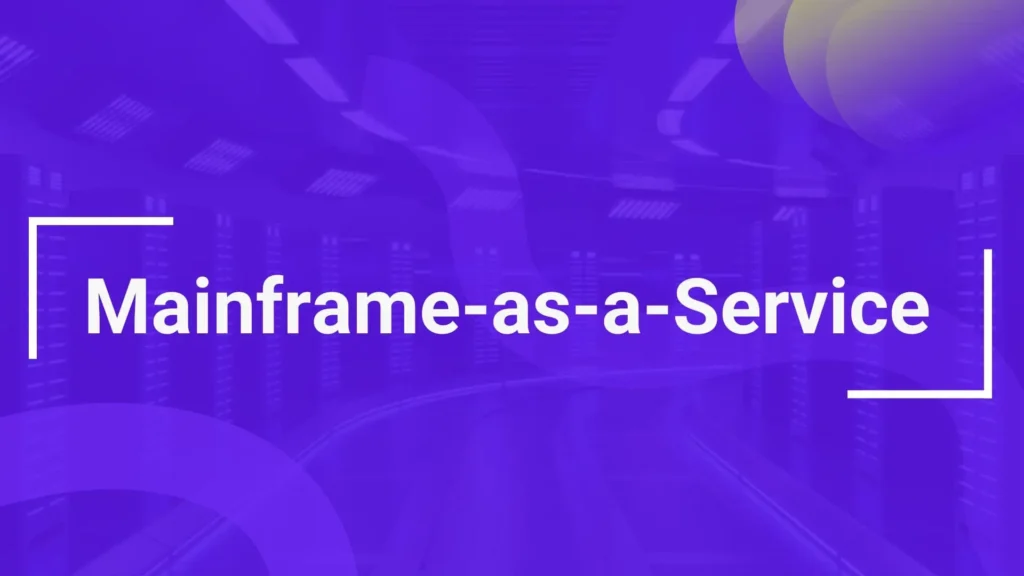The Evolution of Mainframe Technology in a Cloud-First World
Mainframe is the cornerstone of enterprise computing, powering critical applications across industries. In an age dominated by cloud-first strategies, traditional mainframes are often perceived as relics of the past. However, the advent of Mainframe-as-a-Service (MFaaS) is reshaping this narrative. By combining the unparalleled reliability of mainframes with the agility of modern cloud computing, MFaaS offers enterprises an unprecedented opportunity to modernize their legacy systems without sacrificing performance or security.

Understanding Mainframe as a Service (MFaaS)
MFaaS is a cloud-based delivery model that offers mainframe capabilities on a subscription basis. Instead of managing and maintaining on-premises mainframes, businesses can now access these robust systems through managed service providers. With MFaaS, organizations can address legacy system challenges, such as scalability limitations and high operational costs, while aligning with digital transformation goals.
Benefits of MFaaS in Modernizing Legacy Systems
- Scalability and Flexibility
Traditional mainframes often lack the elasticity required to handle fluctuating workloads. MFaaS introduces scalability by allowing businesses to scale resources up or down based on demand, ensuring optimal performance during peak times without unnecessary expenditure.
- Cost Efficiency
Due to hardware upgrades, energy consumption, and staffing, owning and maintaining legacy mainframes can drain financial resources. MFaaS operates on a pay-as-you-go model, significantly reducing capital expenditures while streamlining operations through centralized management.
- Enhanced Security and Compliance
MFaaS providers implement advanced encryption, multi-factor authentication, and regular security audits, ensuring that businesses meet stringent compliance requirements while safeguarding sensitive information.
How MFaaS Bridges the Gap Between Legacy Systems and Modern Applications
Through APIs and middleware, MFaaS enables legacy mainframes to seamlessly interact with modern applications, fostering real-time data exchange and operational synergy. This capability empowers businesses to innovate while leveraging their existing investments in legacy infrastructure.
Key Features of MaaS Driving Legacy System Modernization
- On-Demand Resource Allocation
With MFaaS, organizations can allocate resources dynamically based on workload requirements, optimizing performance and cost efficiency.
- Seamless Integration with Hybrid Cloud Architectures
MFaaS supports hybrid cloud strategies by enabling enterprises to integrate on-premises mainframes with public or private clouds, creating a unified IT ecosystem that enhances flexibility and resilience.
- Advanced Performance Monitoring and Management Tools
MFaaS providers offer sophisticated monitoring tools that deliver real-time insights into system performance. These tools help identify bottlenecks, optimize workloads, and ensure uninterrupted service delivery.
Addressing Common Concerns About Transitioning to MFaaS
- Data Migration Complexities
Migrating data from legacy mainframe systems to MFaaS can be daunting. However, MFaaS providers use advanced tools and methodologies to ensure smooth and secure transitions.
- Skill Gaps and Workforce Challenges
Many IT teams lack the skills to manage MFaaS solutions. Mainframe service providers often offer training and support services to bridge these gaps, empowering teams to maximize MFaaS benefits.
The Future of Legacy Mainframe Systems in a MFaaS-Dominated Era
As digital transformation accelerates, the role of MFaaS in legacy system modernization is growing. Innovations such as AI-driven automation and predictive analytics are expected to enhance MFaaS capabilities further, making it indispensable for enterprises seeking to remain competitive.
Mainframe-as-a-Service or MFaaS is not merely a technology upgrade—it is a strategic enabler for modern enterprises. By leveraging MFaaS, organizations can unlock the latent potential of their legacy systems, driving innovation, enhancing agility, and achieving long-term success in a dynamically evolving digital landscape.


